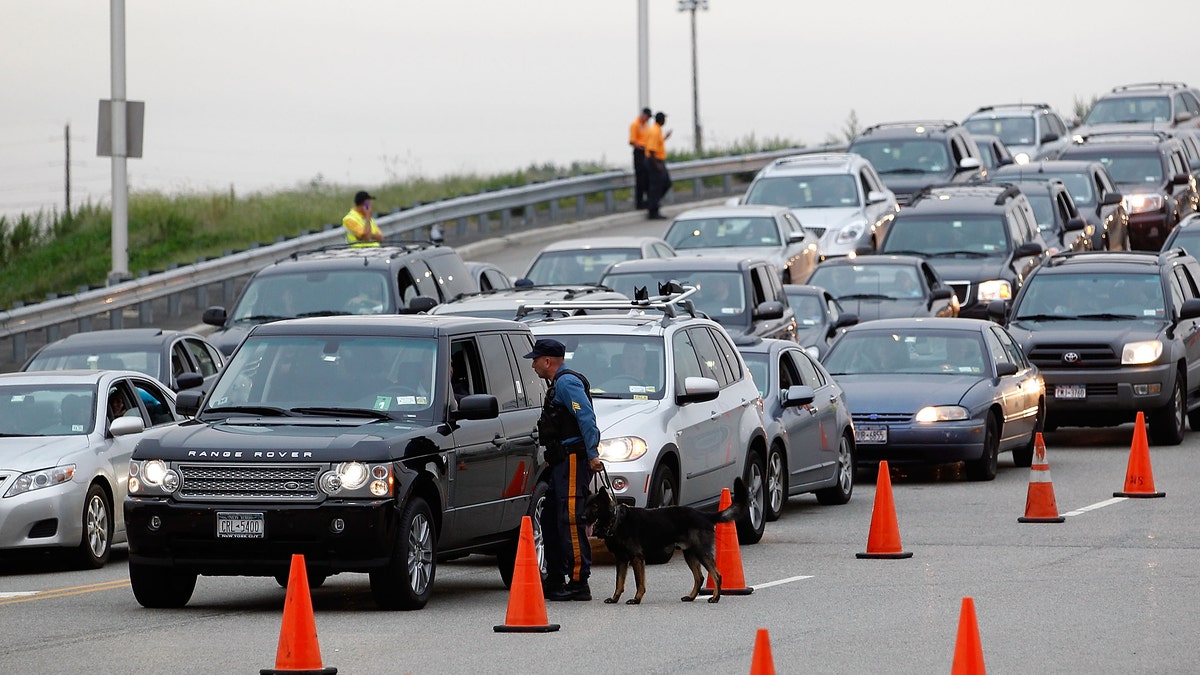
EAST RUTHERFORD, NJ - SEPTEMBER 11: K-9 State Troopers and stadium security inspect cars with dogs as they enter the stadium for the NFL season opener between the New York Jets and Dallas Cowboys at MetLife Stadium on September 11, 2011 in East Rutherford, New Jersey. Extra security is in place at the stadium due to the 10 year anniversary of the 9/11 terror attacks. (Photo by Jeff Zelevansky/Getty Images) (2011 Getty Images)
NEWARK, N.J. – The American Civil Liberties Union says that stricter requirements for people seeking to obtain or renew driver's licenses in New Jersey are being unlawfully imposed and stand to create privacy concerns and hardships for legal immigrants and others.
The state Motor Vehicle Commission planned to start enforcing the new standards on Monday, but courts stepped in to halt enforcement temporarily.
MVC officials have said that any delays in implementing the standards would pose a serious disruption for drivers and adversely affect other program changes the MVC is planning.
"We are extremely disappointed by the ACLU's last-minute move to block implementation of new federal identity requirements," the MVC said in a statement. "Like other states around the nation, New Jersey was implementing the identification program to meet those federal requirements. This action adversely impacts over 3 million drivers and ID holders who are up against a December 2014 enforcement deadline."
ACLU officials, joined by advocates for homeless, immigration and women's groups, said at a news conference Monday that the injunction was sought mainly on claims that the state imposed the system, known as TRU-ID, without publishing details or soliciting public comment as required under state law.
- Mexicana Flight Attendants Turned Calendar Girls Feud after Success
- Celebrities Who Once Were Undocumented
- Best Pix of the Week
- Ali Noorani: A Welcome Change in Angry GOP Rhetoric Over Immigration
- Sonia Sotomayor Critical of Arizona Immigration Law
- Arizona Immigration Law Supreme Court Case 101
- GOP Hispanic Outreach Announcement Gets Derailed by Immigration
- Neo-Nazi Murder-Suicide Suspect was Active in Arizona Anti-Illegal Immigration Politics
"This lawsuit was about process," ACLU New Jersey legal director Ed Barocas said. "It was filed because the state and MVC tried to implement TRU-ID unlawfully, by going around the constitutional mandate."
Previously, people could simply state their Social Security numbers to get a license. Under the new standards, they would have to show the card itself or a paystub or tax documents. They also would have to show two proofs of residence, rather than the one that's required now. And if a passport is used, it would have to be current and not recently expired.
The new requirements would bring the state in line with the federal Real ID Act, which set national standards for driver's licenses and other IDs used for boarding commercial flights and entering federal buildings. More than 20 states have opted not to conform to the federal legislation, ACLU executive director Deborah Jacobs said.
In its motion, the ACLU noted concerns about how the state would collect, store and protect the personal information that people would be required to present. They also cited the likely "substantial costs" of implementing the new standards and said many people -- such as domestic violence victims, homeless people and Americans who were born in other countries -- would likely face new, major hurdles in getting or renewing licenses.
Any delay in imposing the new standards in New Jersey will likely delay implementation of another recent MVC initiative known as Skip the Trip. Under that program, residents born on or before Dec. 1, 1964, with licenses or other IDs expiring in July or later would be able to renew their driver licenses or identification cards by mail.
The state says mail renewals for about 1 million customers 48 and older -- at least for the next several years -- will make it easier for New Jersey to make the move to a more stringent ID system required by federal law.
Residents born after Dec. 1, 1964, will be required to have a new ID by Dec. 1, 2014, under the federal law. Those who can renew by mail won't be required to have new IDs until the end of 2017.
An appellate court upheld a temporary restraining order entered by a judge Friday after the ACLU filed court papers. The order will remain in effect at least until oral arguments are made on Aug. 3, the ACLU said Monday.
Based on reporting by The Associated Press.
Follow us on twitter.com/foxnewslatino
Like us at facebook.com/foxnewslatino
